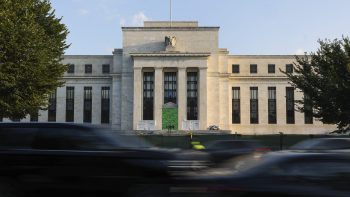The Federal Reserve released the minutes from their most recent meeting today. The executive summary goes something like this — no big policy changes coming, at least in the short term. And the Fed, more than any other institutions out there, is actually doing things to help the economy. Why? Because it can.
Central banks — of which the Federal Reserve is one — have a lot of power without really having to answer to anyone.
“Fundamentally, central banks are anti-democratic” says Neil Irwin, author of a new book about the work of three of the largest central banks after the financial crisis. “In extreme situations, it’s the central banks that have the power and the ability and the speed and the bottomless resources to be able to deal with panics when they happen.
The book is called “The Alchemists” and follows the Fed’s Ben Bernanke, Mervyn King of the Bank of England and Jean Claude Trichet of the European Central Bank after the fallout of the financial crisis of 2008. “What we’ve had in the last five years is a global story that takes place in the United States, in Europe, in Britain and over and over again, it’s been the central bankers, these guys at the Federal Reserve and the European Central Bank and the Bank of England who’ve come together and dealt with this sprawling crisis that keeps zooming from continent to continent and market to market.”
It’s impossible to avoid criticisms about these institutions and the power they wield but Irwin says, it’s very necessary. He notes Bernanke, King, and Trichet were able to respond quickly and with full force to the economic collapse “precisely because they’re secretive guys who meet in private in these strange places.” But the past five years were not without missteps. The biggest regret? Not acting soon enough. “There’s a consistent reluctance to deal with the small problem early on and instead it becomes a very big problem.”
So how does a president or a prime minister go about choosing the person to steer their country’s economy? “No one’s ready for this job. It’s even harder now than it was in 2006 when Ben Bernanke took the job. And frankly, Ben Bernanke, in 2006 wouldn’t be qualified for the job today.” Irwin says the job requires that the candidate be an excellent economist, a superb manager, a politician, a regulator, and a great communicator.
“Very few people in the world …are good at all of those things so what you find if you’re a head of state trying to appoint a central banker, you have to find someone who’s good enough at all of them and hope they learn on the job.”
There’s a lot happening in the world. Through it all, Marketplace is here for you.
You rely on Marketplace to break down the world’s events and tell you how it affects you in a fact-based, approachable way. We rely on your financial support to keep making that possible.
Your donation today powers the independent journalism that you rely on. For just $5/month, you can help sustain Marketplace so we can keep reporting on the things that matter to you.


















